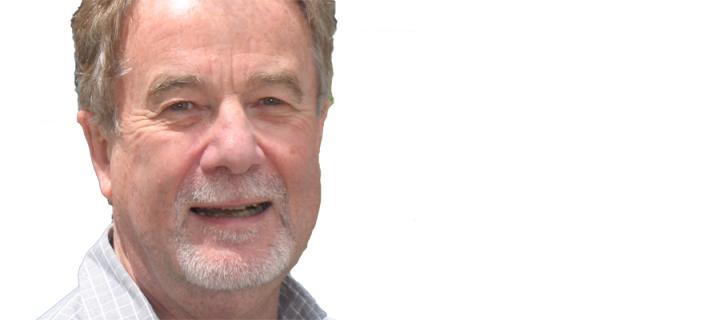John Moffat
Edinburgh was always physics graduate John Moffat’s first choice of university but a conversation with a professor led him down an unexpected path.
| Name |
John Keith Moffat |
| Degree Course |
Honours physics |
| Year of Graduation |
1965 |

Your time at the University
Edinburgh-born, I was brought up in the noted golf centre of Gullane, East Lothian and attended the Royal High School from 1953 to 1961. Realistically, I never thought of attending any university other than Edinburgh. Oxford and Cambridge didn’t recognize Highers (or at least, required Scottish applicants to study for an extra year after high school before applying) and there was no solid academic reason to study at another Scottish university. So Edinburgh it was, where I initially lived at home in Gullane, then moved to Cowan House in George Square (now demolished, the site of the university library), then to Stirling Maxwell House on the Meadows.
Peter Higgs – then a young lecturer working on the theories that led to his proposal of how mass is conferred – was my one-on-one tutor in Mathematical Physics I in my first year, 1961-62. He wrote me a strong reference (I still have it, signed by him) that got me a summer job in 1962 in the physics department of the University of Manitoba. So, off to Winnipeg in Canada for three months where I worked on the construction of a spiral ridge cyclotron, at that time a fairly advanced particle accelerator. I stayed in physics upon my return to Edinburgh but in my final year in the autumn of 1964, a serious conversation with the newly-appointed professor of physics at Edinburgh, the materials scientist Bill Cochran, pointed me to the exciting new areas of biophysics and molecular biology, which I pursued for my Ph.D. at the MRC laboratory of Molecular Biology in Cambridge with the head of the lab, the Nobel laureate Max Perutz.
I was very active in the club for undergraduate physics students, PhysSoc, which involved hikes to Dun Rig, along the Forth and in Kintail, co-ed field hockey, organising dances in the Union and at King’s Buildings, trips down a coal mine and to a satellite tracking station and some serious physics lectures believe it or not! We founded and endowed (in the back room of a pub on Drummond Street) what became the Appleton Memorial Lecture in physics with 100 pounds profit from one of those wildly successful dances.
I remember a rectorial election where students from Cowan House sponsored a candidate (Julius Nyerere?) and the engineers had sponsored another candidate (Sean Connery) and attacked heavily-defended Cowan House in the middle of the night. We had made roof-mounted floodlights from orange crates and old Rolls-Royce headlight reflectors, to no avail when the engineers broke down a basement door and threw the main circuit-breaker. The election of course culminated in the traditional pitched battle between rival groups of supporters in the old quadrangle, fought with cow entrails and bags of soot but amazingly, resulted in no serious injuries. And Charities Week, the outwith campaign, dances in the Miners’ Welfare at Bilston, the decorated parade of floats through the centre of Edinburgh.
My first car, a 1931 Riley Monaco, bought for 10 pounds from the physics lecturer, Ronnie Mackie. His wife, a wiry but small concert pianist, didn’t have the strength to operate the car’s cable brakes safely; stopping depended entirely on how hard you pushed the brake pedal. And girlfriends….Edinburgh was great!
Edinburgh laid the foundation for my career and the conversation there with Professor Cochran redirected it, as it was the most influential conversation I’ve ever had. Cambridge topped it off.
Tell us about your Experiences since leaving the University
I was a research student of King’s College, Cambridge during 1965 to 1969 and also found time to assist in filming a natural history for the BBC, St. Kilda: The Lonely Islands. I was sales manager of the magazine Granta, which was still a student publication then, and edited the first catalogue of the Kettle’s Yard Art Collective, which had just been donated to Cambridge University, and published it as a supplement to Granta. In 1969 to 1990 I was a post doctorate, then Associate Professor of Biochemistry and Molecular Biology at Cornell University, Ithaca, New York. I founded MacCHESS, a synchrotron X-ray source for structural biology.
In 1973 I married the proverbial “nice Jewish girl from the Bronx, New York”, Anne Beatrice Simon and we’re still happily married 41 years later. We adopted our son, David Andrew Moffat, as an infant in 1982. From 1990 to present I have been Professor and then Louis Block Professor of Biochemistry, Molecular and Cell Biology at the University of Chicago and also Deputy Provost for Research 2002 to 2010. I founded and still head BioCARS another synchrotron X-ray facility at Argonne National Laboratory outside Chicago. I’m still having fun in research, admin and teaching; when it stops being fun I’ll finally retire. We recently gave our collection of 18th century wine glasses (with their origins in Kettle’s Yard days) to the Art Institute of Chicago; and I’m continuing to drive the first, wildly impractical sports car I bought in America in 1970, a supercharged 1949 MC-TC. My wife, Anne, is active in support of the Joffrey Ballet of Chicago.
Edinburgh laid the foundation for my career and the conversation there with Professor Cochran redirected it, as it was the most influential conversation I’ve ever had. Cambridge topped it off.
Alumni wisdom
Be interested in many things; you never know what paths your life will take. Luck is important! It makes a difference to be in the right place at the right time (though usually with the wrong amount of money) – and to REALIZE that’s what’s going on. Take risks…
If it isn’t fun, don’t do it!

